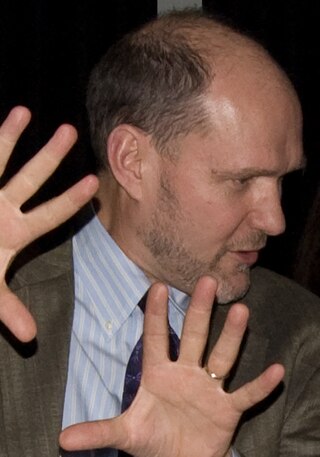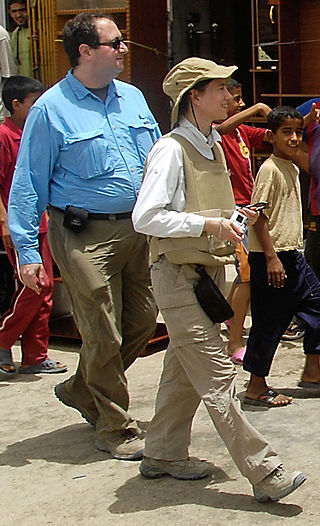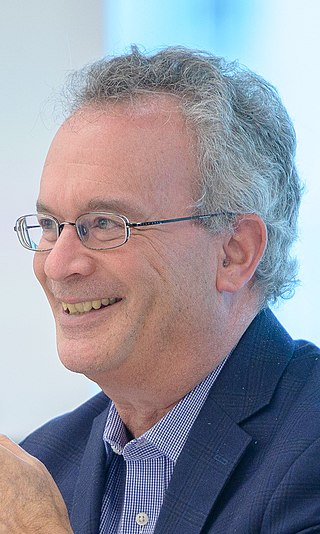Related Research Articles

Stephen Martin Walt is an American political scientist currently serving as the Robert and Renee Belfer Professor of international relations at the Harvard Kennedy School.
The Project for the New American Century (PNAC) was a neoconservative think tank based in Washington, D.C., that focused on United States foreign policy. It was established as a non-profit educational organization in 1997, and founded by William Kristol and Robert Kagan. PNAC's stated goal was "to promote American global leadership". The organization stated that "American leadership is good both for America and for the world", and sought to build support for "a Reaganite policy of military strength and moral clarity".

The Council on Foreign Relations (CFR) is an American think tank specializing in U.S. foreign policy and international relations. Founded in 1921, it is an independent and nonpartisan 501(c)(3) nonprofit organization. CFR is based in New York City, with an additional office in Washington, D.C. Its membership has included senior politicians, secretaries of state, CIA directors, bankers, lawyers, professors, corporate directors, CEOs, and prominent media figures.

Eliot Asher Cohen is an American political scientist. He was a counselor in the United States Department of State under Condoleezza Rice from 2007 to 2009. In 2019, Cohen was named the 9th Dean of the Paul H. Nitze School of Advanced International Studies (SAIS) at Johns Hopkins University, succeeding Vali Nasr. Before his time as dean, he directed the Strategic Studies Program at SAIS. Cohen "is one of the few teachers in the American academy to treat military history as a serious field", according to international law scholar Ruth Wedgwood. Cohen is a contributing writer at The Atlantic. He is also, with Eric Edelman, a co-host of the Shield of the Republic podcast, published by The Bulwark.

Frederick W. Kagan is an American resident scholar at the American Enterprise Institute (AEI) and a former professor of military history at the U.S. Military Academy at West Point.

Robert Jervis was an American political scientist who was the Adlai E. Stevenson Professor of International Politics in the Department of Political Science at Columbia University. Jervis was co-editor of the Cornell Studies in Security Affairs, a series published by Cornell University Press.
Robert L. Gallucci is an American academic and diplomat, who formerly worked as president of the John D. and Catherine T. MacArthur Foundation. He previously served as dean of the Edmund A. Walsh School of Foreign Service at Georgetown University, from 1996 to June 2009. Prior to his appointment in 1996, for over two decades he had served in various governmental and international agencies, including the Department of State and the United Nations.

Ashton Baldwin Carter was an American government official and academic who served as the 25th United States secretary of defense from February 2015 to January 2017. He later served as director of the Belfer Center for Science & International Affairs at Harvard Kennedy School.

Fred M. Kaplan is an American author and journalist. His weekly "War Stories" column for Slate magazine covers international relations and U.S. foreign policy.

David Howell Petraeus is a retired United States Army general and public official. He served as director of the Central Intelligence Agency from September 6, 2011, until his resignation on November 9, 2012. Prior to his assuming the directorship of the CIA, Petraeus served 37 years in the United States Army. His last assignments in the Army were as commander of the International Security Assistance Force (ISAF) and commander, U.S. Forces – Afghanistan (USFOR-A) from July 4, 2010, to July 18, 2011. His other four-star assignments include serving as the 10th commander, U.S. Central Command (USCENTCOM) from October 13, 2008, to June 30, 2010, and as commanding general, Multi-National Force – Iraq (MNF-I) from February 10, 2007, to September 16, 2008. As commander of MNF-I, Petraeus oversaw all coalition forces in Iraq.
Robert Jeffrey Art is Christian A. Herter Professor of International Relations at Brandeis University, and Fellow at MIT Center for International Studies. He subscribes to the theory of neorealism, which argues that force still underlies the power structure in the modern world. He is a member of the Council on Foreign Relations, a United States nonprofit think tank specializing in U.S. foreign policy and international affairs.

Meghan L. O'Sullivan is a former deputy national security adviser on Iraq and Afghanistan. She is Jeane Kirkpatrick Professor of the Practice of International Affairs at Harvard Kennedy School and a board member of the Belfer Center for Science and International Affairs at Kennedy School. She is a member of the board of directors of the Council on Foreign Relations, and Raytheon, and the North American chair of the Trilateral Commission.

Thomas Edwin "Tom" Ricks is an American journalist and author who specializes in the military and national security issues. He is a two-time winner of the Pulitzer Prize for National Reporting as part of teams from the Wall Street Journal (2000) and Washington Post (2002). He has reported on U.S. military activities in Somalia, Haiti, Korea, Bosnia, Kosovo, Macedonia, Kuwait, Turkey, Afghanistan, and Iraq. He previously wrote a blog for Foreign Policy and is a member of the Center for a New American Security, a defense policy think tank.
Stephen Peter Rosen is a Harvard College Professor and Beton Michael Kaneb Professor of National Security and Military Affairs in the Government Department in the Faculty of Arts and Sciences at Harvard University and is known as a neoconservative. In addition to his academic work, Rosen was also Master of Harvard College's Winthrop House from 2003 to 2009. He is also Senior Counsellor to the Long Term Strategy Group based in Washington D. C., a defense consulting firm.

Kimberly Ellen Kagan is an American military historian. She founded and heads the Institute for the Study of War and has taught at West Point, Yale, Georgetown University, and American University. Kagan has published in The Wall Street Journal, The New York Times, The Weekly Standard and elsewhere. In 2009, she served on Afghanistan commander Gen. Stanley McChrystal's strategic assessment team.

Gian P. Gentile is a retired US Army colonel, who served for many years as a history professor at the United States Military Academy at West Point. Gentile has also been a visiting fellow at the Council on Foreign Relations and a senior historian at the RAND Corporation. He is a leading critic of U.S. military counter-insurgency doctrine.
Michael Dalzell Swaine is a senior research fellow in the field of China and East Asian security studies at the Quincy Institute for Responsible Statecraft. Prior to joining the Quincy Institute, Swaine was a Senior Associate in the Asia Program at the Carnegie Endowment for International Peace. Before joining the Carnegie Endowment as co-director of the China Program in 2001, Swaine worked for 12 years at the RAND Corporation, where he was appointed as the first recipient of the RAND Center for Asia-Pacific Policy Chair in Northeast Asian Security.

The Institute for the Study of War (ISW) is an American nonprofit research group and advocacy think tank founded in 2007 by military historian Kimberly Kagan and headquartered in Washington, D.C. ISW provides research and analysis regarding issues of defense and foreign affairs. It has produced reports on the Syrian civil war, the War in Afghanistan, and the Iraq War, "focusing on military operations, enemy threats, and political trends in diverse conflict zones". ISW currently publishes daily updates on the Russian invasion of Ukraine and the Israel-Hamas War. ISW also published daily updates on Mahsa Amini protests in Iran.

Paula Dean Broadwell is an American writer, academic and former military officer. Broadwell served in the US Army on both active and reserve duty for over 20 years. In 2012, she co-authored, with Vernon Loeb, All In: The Education of General David Petraeus, a biography of then-International Security Assistance Force commander David Petraeus. She is the co-founder and co-director of the Think Broader Foundation, a media consulting firm that focuses on addressing gender bias in the media and society. Broadwell is most notable for her involvement in the Petraeus scandal.

James M. Goldgeier is a professor of international relations at the School of International Service at American University in Washington, D.C., where he served as dean from 2011 to 2017.
References
- 1 2 "Biddle, Stephen 1959- (Stephen D. Biddle)". Contemporary Authors . 2007. Archived from the original on 2015-04-02.
- ↑ "Stephen Biddle". Columbia SIPA. Retrieved June 8, 2020.
- 1 2 3 "Conversation with Stephen D. Biddle, p. 1 of 7". Institute of International Studies at U.C. Berkeley. 2006. Retrieved March 27, 2011.
- 1 2 3 4 5 6 "Stephen Biddle – Council on Foreign Relations – Bio" (PDF). Council on Foreign Relations . Retrieved March 24, 2011.
- 1 2 "Conversation with Stephen D. Biddle, p. 2 of 7". Institute of International Studies at U.C. Berkeley. 2006. Retrieved March 27, 2011.
- ↑ "NEW FACULTY & RESEARCH SCHOLARS 2018–19". Columbia SIPA. September 5, 2018. Retrieved June 8, 2020.
- ↑ Freedman, Lawrence D. (17 June 2021). "Two Books on Military Strategy and Nonstate Actors". Foreign Affairs (May/June 2021). Retrieved 24 July 2022.
- 1 2 "Conversation with Stephen D. Biddle, p. 6 of 7". Institute of International Studies at U.C. Berkeley. 2006. Retrieved March 27, 2011.
- ↑ "Conversation with Stephen D. Biddle, p. 4 of 7". Institute of International Studies at U.C. Berkeley. 2006. Archived from the original on April 6, 2012. Retrieved March 27, 2011.
- ↑ Biddle, Stephen (July–August 2009). "Is It Worth It?". The American Interest . Archived from the original on March 29, 2011. Retrieved March 27, 2011.